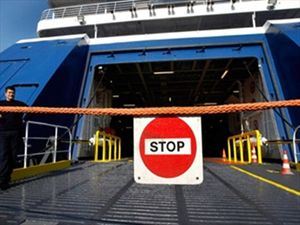Victoria Mindova
Strikes, protests and blocked ports in Greece are some of the major problems for the tourists who want to visit the Mediterranean islands during the summer. The permanent blockades made 2010 and 2011 some of the worst years for local tourism. They exhausted and made nervous both the visitors to the country and the people working in the field of maritime transport.
The beginning of the 2013 season has also started with some tension but it seems that the protests will not continue this year. We expect trouble-free voyages to some of the best places on earth - the islands of the Aegean Sea. This is the assurance GRReporter has received from Michalis Sakelis, president of the association of passenger shipping companies, who is also the head of the Blue Star Ferries ferry company.
 "There will be no more strikes this season. The owning companies have reached consensus on the payment of the obligations to the crews," states the businessman. "We have improved and strengthened our relationship with the Hellenic Federation of Maritime Workers (PNO) by signing a collective labour agreement."
"There will be no more strikes this season. The owning companies have reached consensus on the payment of the obligations to the crews," states the businessman. "We have improved and strengthened our relationship with the Hellenic Federation of Maritime Workers (PNO) by signing a collective labour agreement."
After the change of the employment law, employers in key sectors of the economy are no longer obliged to sign collective labour agreements. They can use more flexible methods of payment and employment, which have been introduced after the change of the legal framework. However, the companies and trade unions in the sector decided to make mutual concessions for the sake of the common interest.
The businessman stresses that ferry companies earn half of their revenue in July and August. During the rest of the year, the companies are operating at a loss, awaiting the summer to be able to restore the balance in their budgets. This is why some of the companies operating in the market delay the payments to the employees. "A large part of the delayed payments have already been made this week and the problems will be solved by July," says Sakelis.
Between 2009 and 2012, the passenger flow in the civil fleet fell by 22%.He stresses that the business is facing many challenges. Between 2009 and 2012, the passenger flow in the civil fleet fell by 22%. "We are in crisis. The sustainability of our fleet is based mainly on passengers from Greece and less on foreign visitors. The crisis that has deepened in recent years has also affected the movement of the Greeks who travel to and from the islands in summer and winter," says Sakelis. He explains that the companies have reduced the number of their routes following the decline in the total number of passengers.
"You should note that the problems in maritime transport are not typical only for Greece. In recent years, fuel prices across the world have nearly doubled. All companies owning cruise ships are experiencing difficulties at present. That is why the purchase and sale of such vessels have significantly decreased," states the head of Blue Star Ferries.
The measures that the Greek ferry companies are taking to withstand the crisis are complex and include reduction of routes, reduction of operating costs and imposition of lower speeds in order to save on fuel consumption. However, the price of ferry tickets remains high in Greece.
The measures that the Greek ferry companies are taking to withstand the crisis are complex and include reduction of routes, reduction of operating costs and imposition of lower speeds in order to save on fuel consumption. However, the price of ferry tickets remains high in Greece."Indeed, the prices of our services are high but there is not much we can do about it," admits the businessman. Over 60% of the ticket price goes to cover fuel costs. The increase in fuel prices inevitably affects the consumers. Furthermore, the ticket price includes many taxes and fees, which additionally burden the end consumer price.
"The VAT included in the cost of transporting a car by ferry is 23% in Greece. In other European countries, the VAT on this service is in the range of from zero to six percent. The VAT on passenger tickets is 13%. We insist on reducing this value to 6.5% in order to make the service more accessible."
Like all representatives of real business, Michalis Sakelis did not fail to note the difficulties brought by the instability of the financial system. "Banks, not only in Greece but also in Europe, are not granting loans that can cover short-term needs. Now, the entire European system is experiencing difficulties and this affects everyone," states the businessman.
The good news is that Greek shipping companies are not afraid of competition. Unlike other sectors, the leaders in the local civilian fleet find the small competition abroad a good challenge.
Sakelis believes that the passenger ships (ferries and catamarans) that are currently serving the Greek islands are some of the best in the market. This raises the bar for foreign firms, which for the most part, do not have high-class ships. "Our sector is liberalized and foreign companies have the opportunity to enter the local market if they have investment interest like we are present in foreign ports. However, I do not expect that such interest will be declared soon. There are no passenger ships in Europe that are suitable for serving the Greek islands. A few of them meet the standards for serving islands like Crete, Lesbos or Chios but they are not as good as the ferries that we already have."
Despite the positive signals coming from Athens and Brussels, economic growth remains a distant goal for the country. This inevitably affects the activity of enterprises. We wanted to find out whether any of the major ferry companies might go bankrupt next year. "In Greece, it is very difficult to predict what might happen. We do not expect any changes in the market in the summer. However, do not ask me how things will develop in 2014 or 2015. This is not yet known to any of us," admits the chairman of the association.
In conclusion, he stresses that whatever changes occur in Greece, civil maritime transport will never cease to exist. "There will always be vessels that will connect the mainland with the islands, both in Greece and Italy. There are no two ways about it. There are problems, but you should not expect that the navy would collapse."
The head of the association of passenger shipping companies Michalis Sakelis expects that the 2013 season will be good. Early signs indicate that this year’s passenger volume will remain at 2012 levels, which is reassuring. Foreign tourists prefer the Cycladic Islands again and inter-island connections that allow the tourists to arrive to an island by plane and to go to the neighbouring islands by ferry remain the most profitable. "We are positive about this season’s results but we have to wait a bit to see the percentage of last minute sales."
The turn
We talked with Michalis Sakelis on Thursday evening when the main trade union organization had  already signed collective labour agreements with the employers' organization. The main trade union body has unofficially buried the "war hatchet" which, most likely, is the basis of Sakelis’ explicit promise that there will be no more strikes this summer.
already signed collective labour agreements with the employers' organization. The main trade union body has unofficially buried the "war hatchet" which, most likely, is the basis of Sakelis’ explicit promise that there will be no more strikes this summer.
One organization (the Hellenic Union of Merchant Marine Staff) among the 11 trade unions which are subject to the PNO had decided to continue the strike. 11 of its members blocked the entrance to the "Penelope" ferry at the port of Rafina with two cars, demanding the immediate payment of the outstanding salaries for seven months. As a result, two strikers, namely the cashier and the general secretary of the union, were arrested for disturbing the peace. We could not find a representative of the union forces for a comment but the incident shows that this summer may not be as easy as hoped by the passengers and owners of ferry companies.